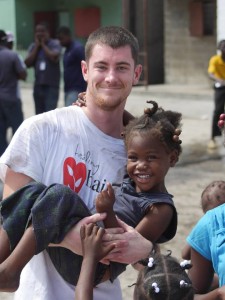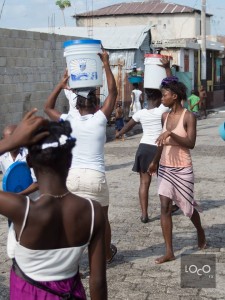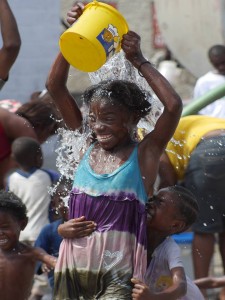 Micah Rasmussen of Jefferson was part of a team of 16 volunteers who spent a week in Port-au-Prince, Haiti last month with the Christian non-profit organization Healing Haiti. Haitians had just a week earlier noted the four year anniversary of the earthquake that killed between 300,000 and 500,000 people.
Micah Rasmussen of Jefferson was part of a team of 16 volunteers who spent a week in Port-au-Prince, Haiti last month with the Christian non-profit organization Healing Haiti. Haitians had just a week earlier noted the four year anniversary of the earthquake that killed between 300,000 and 500,000 people.
Two weeks after the trip, he summed it up as “eye opening, rewarding, and heartbreaking, all in one.”
Healing Haiti is based in the Twin Cities. The January trip was led by a cousin of Rasmussen and her husband, both of whom are attorneys. Rasmussen said the volunteers ranged in age from 17 to 57 and included a plumber, an art student, a professional photographer from Mayo Clinic, high school students and an “underemployed soldier,” as he referred to himself.
 In Haiti the team distributed enriched meals from the non-profit Feed My Starving Children, and safe water from a tanker truck. They took with them from the States basic hygiene supplies, diapers, baby formula, and toys. The travelers lived out of their carry-on baggage so they could fill their checked bags with donations. The donations were taken directly to homes rather than distributed on the street.
In Haiti the team distributed enriched meals from the non-profit Feed My Starving Children, and safe water from a tanker truck. They took with them from the States basic hygiene supplies, diapers, baby formula, and toys. The travelers lived out of their carry-on baggage so they could fill their checked bags with donations. The donations were taken directly to homes rather than distributed on the street.
The volunteers also visited hospitals, orphanages and the elderly.
Rasmussen said he decided a year ago to make the trip. “I was particularly inspired by a verse in the Bible where Jesus tells His followers, ‘Whatever you did for one of the least of these, (the poor) you did for me’ (Matthew 25:40). Having an opportunity to serve Him through others is something I try to do as much of as possible,” he said.
Locally, he volunteers at Manna Ministry (a food pantry run by Dwelling Place and housed in the skating rink), plays guitar at church, helps with some Bible studies, performs free car maintenance for friends, and does “anything I can to help those around me and acknowledge there is more to life than the typical ‘American dream’ where everyone lives solely for themselves,” he explained.
Rasmussen said the trip was very worthwhile.
“I loved the feeling of making an instantaneous difference in someone’s life by handing them food, and seeing the gratitude in their eyes first hand,” he said. “ I was not as thrilled when seeing naked children running around amidst shacks and garbage heaps with the smell of human feces in the air. This was shocking and uncomfortable for me to experience – of course – but far more disturbing is the fact that all the people there aren’t merely visiting. On the contrary; this is all they know about existing in the world. The children there have never had a hot shower. They have never flushed a toilet. They didn’t get their vaccinations when they were born, because they have never in their whole lives been to a doctor.
 “To grasp the magnitude of the differences between our two polar opposite worlds is a staggering undertaking. Even now, nearly two weeks after returning to the US, I haven’t been able to sort through it all and figure out exactly what to do next. But do something, I will!”
“To grasp the magnitude of the differences between our two polar opposite worlds is a staggering undertaking. Even now, nearly two weeks after returning to the US, I haven’t been able to sort through it all and figure out exactly what to do next. But do something, I will!”
A highlight of the trip was their first stop, and the adorable child who jumped into his arms and kissed him, Rasmussen said. “I got the impression she didn’t get held too often.”
The volunteers sang with the kids songs about how good God is. “Truly it was beyond belief to see the poorest of the poor praising God despite despicable circumstances,” he said, adding that it was fun attempting to sing along in Kreyól (Creole).
He said the most heartbreaking sights of the trip were the malnourished children. He described a frail child who looked like a newborn and was barely able to breathe. She had recently been taken to the orphanage, and it was determined she was 2 years old. The damage done to her starving body was likely irreversible, Rasmussen said.
The volunteers also visited the somber Port-au-Prince mass gravesite. “Our guides shared some of the horror of those days and how many family members and friends they had each lost. No one knows how many thousands of bodies were buried there with the rubble,” he said.
He described the only hospital in the city where anyone can go to receive treatment, not just the rich. “It was nothing at all like we consider a hospital. We went to the pediatric care area, a pair of barn like buildings with beds/cribs packed all the way around the large room. Parents sit with kids and we visited them all and gave care packages of basic meds, diapers, baby formula and toys. Even while there, little to no care is given patients, and even simple things like an IV must be bought locally by parents and then brought to the hospital for use. The hospital does not feed patients. They don’t do much of anything. Another shocker in the stark contrast of what we expect in our country. Suddenly I’m a little less inclined to complain about the bloated prices in the American healthcare industry,” Rasmussen said.
There was a 110 degree temperature difference between Haiti and Iowa when he returned, but aside from that, he was grateful to come home. “The ability to turn on clean water at one of five different places in the house should not be taken for granted! I realize though, that if gratitude is my only response to this experience, I have grossly missed the mark – the world would continue to revolve around me.
“ I am determined to serve with increased vigor both the impoverished across the world, and those neighbors of ours who need a hand. I encourage everyone to count their many blessings and find a way to give back to others. Whether it is across the ocean or across the street, we can all do something.”
Information about Healing Haiti can be found at www.healinghaiti.org
